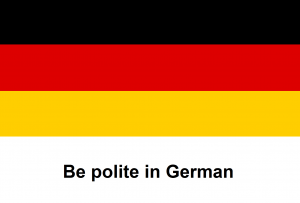Difference between revisions of "Language/German/Grammar/Be-Polite"
Jump to navigation
Jump to search
m (Quick edit) |
|||
| Line 1: | Line 1: | ||
[[File:Be polite in German .png|alt=Be polite in German|thumb|Be polite in German]] | [[File:Be polite in German .png|alt=Be polite in German|thumb|Be polite in German]] | ||
[[File:German-lesson-du-or-sei.jpg|thumb]] | [[File:German-lesson-du-or-sei.jpg|thumb]] | ||
__TOC__ | |||
Hello everybody, | Hello everybody, | ||
| Line 17: | Line 18: | ||
#The same goes for the formal way of 'Ihre' (your), 'Ihr' (your) 'Ihnen' (you) and 'Ihren' (your). | #The same goes for the formal way of 'Ihre' (your), 'Ihr' (your) 'Ihnen' (you) and 'Ihren' (your). | ||
| Line 24: | Line 24: | ||
! | ! | ||
! | ! | ||
'''GERMAN''' | |||
|- | |- | ||
| | | | ||
| Line 53: | Line 53: | ||
|Gleiches gilt für den formalen Weg von 'Ihre', 'Ihr' (Ihr), 'Ihnen' und 'Ihr'. | |Gleiches gilt für den formalen Weg von 'Ihre', 'Ihr' (Ihr), 'Ihnen' und 'Ihr'. | ||
|} | |} | ||
==Authors== | ==Authors== | ||
Revision as of 23:33, 19 March 2023
Hello everybody,
In today's lesson you will learn some useful vocabulary about ¨BEING POLITE¨ in German.
Well, I guess every foreigner has heard about that famous German formal version of 'you'.
- The informal translation is 'du', which is used when you're talking to family members, friends, basically people you're close to or when you talk to other adolescents or children.
- When you're talking to an authority person, like adults, officers and teachers, you must say 'sie'.
- So when you're talking to your classmate you say 'Kannst du mir helfen?' (Can you help me?) and when you're talking to your teacher you say 'Können sie mir helfen?'. Both has the same translation.
- When you can't say for sure if the person you're talking to is the same age as you are or maybe already over 18, you should better say 'sie' because if the person really is older than 18 he or she would feel offended.
- Another point is writing formal letters and e-mails.
- The formal 'you' is written 'Sie' and the informal 'you' can be written 'du' but also 'Du'.
- The same goes for the formal way of 'Ihre' (your), 'Ihr' (your) 'Ihnen' (you) and 'Ihren' (your).
|
GERMAN | |
|---|---|
| 01 | Nun, ich denke, jeder Ausländer hat von dieser berühmten deutschen offiziellen Version von "Sie" gehört. |
| 02 | Die informelle Übersetzung lautet "du" und wird verwendet, wenn Sie mit Familienmitgliedern, Freunden, im Grunde genommen Menschen, denen Sie nahe stehen, oder wenn Sie mit anderen Jugendlichen oder Kindern sprechen. |
| 03 | Wenn Sie mit einer Autoritätsperson wie Erwachsenen, Offizieren und Lehrern sprechen, müssen Sie "sie" sagen. |
| 04 | Wenn Sie also mit Ihrem Klassenkameraden sprechen, sagen Sie: "Kannst du mir helfen?" (Kannst du mir helfen?) Und wenn du mit deinem Lehrer sprichst, sagst du 'Können sie mir helfen?'. Beide haben die gleiche Übersetzung. |
| 05 | Wenn Sie nicht sicher sagen können, ob die Person, mit der Sie sprechen, genauso alt ist wie Sie oder vielleicht bereits über 18 Jahre alt ist, sollten Sie besser "sie" sagen, denn wenn die Person wirklich älter als 18 Jahre ist, würde sie sich fühlen beleidigt. |
| 06 | Ein weiterer Punkt ist das Schreiben von formellen Briefen und E-Mails. |
| 07 | Das formale "du" ist geschrieben "Sie" und das informelle "du" kann geschrieben werden "du", aber auch "du". |
| 08 | Gleiches gilt für den formalen Weg von 'Ihre', 'Ihr' (Ihr), 'Ihnen' und 'Ihr'. |

